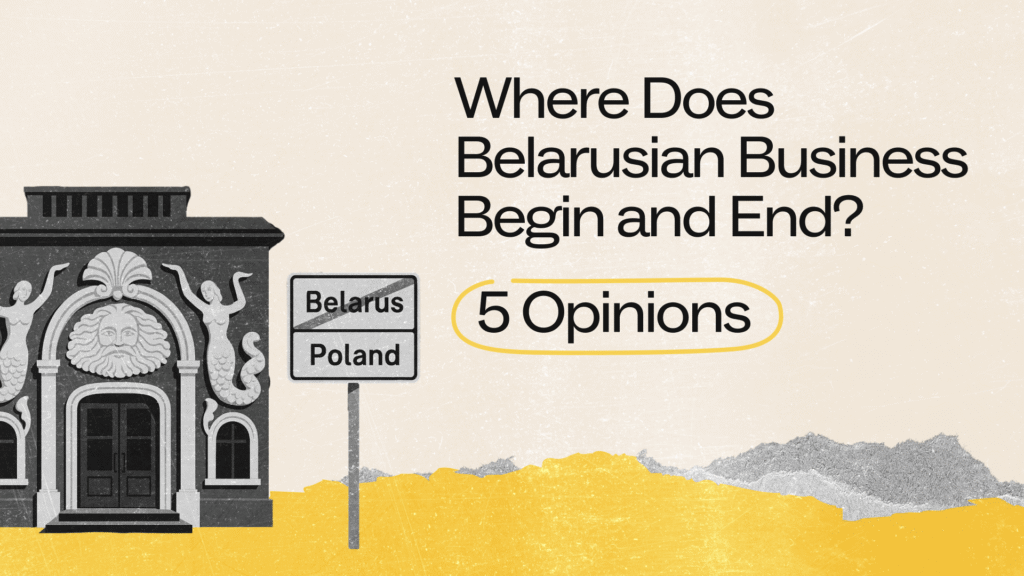This translation was generated using artificial intelligence. We strive for accuracy and quality, but automated translations may contain errors. You can read the original text here.
After 2020, thousands of Belarusian companies moved their operations abroad. At the same time, some Belarusians who found themselves outside the country decided to start their own businesses rather than seek employment. As a result, tens of thousands of legal entities founded by Belarusians have emerged around the world. Over time, some of the company owners obtained citizenship in other countries, and for many of these businesses, there are now no clear signs of their Belarusian roots.
Still, the question arises from time to time: who qualifies as a Belarusian business abroad? There’s still no clear answer to what makes a business truly “Belarusian.” No single definition or standard currently exists. Opinions and approaches vary: some emphasize the founders’ national origins, others focus on self-identification, and still others value contributions to Belarusian communities abroad.
Alexander Maslov, entrepreneur: “If a Belarusian starts a company in Poland, it becomes a Polish company.”
I don’t believe in the concept of “Belarusian business abroad,” because business lives and competes — and therefore evolves — within the context of its location, often in partnership with people of various nationalities. If a Belarusian entrepreneur starts a company in Poland, it becomes a Polish company; if it operates across multiple countries, an international one. The only exceptions are perhaps niche projects tied to Belarusian symbols or the niche of “professional Belarusians.”
But I do believe in the Belarusian character of people of action and entrepreneurs. Their activity is a root system that can grow far beyond Belarus and gain strength from international experience and opportunity. By integrating into the global community, these entrepreneurs and professionals become channels for ideas, expertise, and resources flowing back to Belarus. Thanks to such individuals, Belarusian society will receive support and opportunities to develop, find the means to grow its culture, cultivate a confident identity, and learn the culture of competition and liberal, non-abusive solidarity.
Tatsiana Marinich, CEO of Imaguru: “What the founders themselves think matters most”
This question has been relevant ever since Belarusian businesses began operating in exile on a large scale. Today, being a Belarusian business is not so much a legal classification as it is a value-based one — something that helps define a company’s identity. In this sense, the main criterion for making such a determination is whether the business was founded by Belarusians and retains a meaningful connection to the Belarusian identity. Not in a geographic or commercial sense, but in the image of the team, the company’s mission, its culture, or its contribution to the Belarusian community.
In addition, it’s important to consider whether this identity is a conscious choice by the founder. That is, first and foremost, whether the founder themselves considers their company to be Belarusian. There are examples of businesses that have chosen to preserve their Belarusian identity and openly emphasize it — whether for economic reasons or value-driven ones. Others, however, prefer to distance themselves from their origin.
When the question is purely formal, such as for statistical purposes, I would classify such businesses by the origin of the founder. In that case, this becomes the key criterion — regardless of where the company is registered or what citizenship the founder currently holds. But if we dig deeper and look at priorities, values, and the role a company plays within the Belarusian community, then the value-driven identity takes precedence.
Aliaksandr Knyrovich, entrepreneur: “A passport or origin alone doesn’t make a business Belarusian.”
When we were still in Belarus, there was no question about whether a business was Belarusian or not. Simply being located in the country and having a Belarusian passport made it so. But now, with so many companies having relocated or launched abroad, the question has become more relevant. I see three criteria that define whether a business abroad can be considered Belarusian:
First, if the company hires Belarusians. If we see a business where more than 50% of the employees are Belarusian, then it is undoubtedly a Belarusian business.
Second, if the company promotes Belarusian identity through its products or services. This doesn’t have to mean traditional symbols like Slutsk belts or national ornaments. Rather, it’s anything that is associated with Belarus in the minds of fellow Belarusians.
Third, when a business, while earning profit, sees it as its responsibility to support Belarusian initiatives and help preserve national identity.
As you can see, this list says nothing about the founder’s origin or passport. That’s because neither of them is decisive. You may hold a Belarusian passport, register a logistics company in Poland, hire Polish staff, work with local banks, and serve Polish-Hungarian trade flows. And despite your Belarusian passport, there may be absolutely nothing Belarusian about your business.
Olga Loyka, Editor-in-Chief of the Plan B project: “What matters is how the business positions itself.”
A business can still be considered Belarusian if it wants to be — if the risks associated with its country of origin don’t outweigh that desire. And they often do. A business is Belarusian if it chooses to identify as such, if the founder still holds a Belarusian passport, if Belarusians make up the core of the team, if there are still employees and legal entities operating inside Belarus. The real question is: for how long?
There’s usually no point in talking about Belarusian branding unless the company targets the diaspora. A couple of years go by — and the founder’s passport changes. The team includes more and more employees from other countries. At that point, it’s essentially a company with Belarusian roots — founded by someone originally from Belarus.
That said, Belarusians themselves — and researchers — can go on considering it Belarusian based on formal indicators like the founder’s former passport or place of birth. That’s fine for research purposes and classification. But for making demands — to fund something, to use the Belarusian language, and so on — it’s largely meaningless.
Cimafiej Akudovič, historian: “To be Belarusian, a business must represent, invest, and be supported by someone specific.”
When we talk about a company operating inside Belarus, the answer is simple and clear. But when it comes to legal entities working abroad, the same criteria no longer apply. However, there are other ones. For example, if you purposefully hire Belarusians abroad, that is a position that allows us to say this is a Belarusian business. The same goes for spending resources on Belarus-related projects. Another important and straightforward criterion is self-identification as a “Belarusian business,” which places a significant burden on the owners, as it involves certain risks and related costs.
At the same time, due to the toxicity of the Belarusian government, when a business is called “Belarusian,” it is sometimes perceived as an accusation of ties with the regime. In many cases, even the mere fact of being from Belarus or having Belarusian roots can complicate operations. That is why some companies prefer to distance themselves from any Belarusian origin.
Through the lens of business, the issue of agency within the Belarusian diaspora becomes especially evident. For a business to be Belarusian, it needs to represent, invest in, or receive support from someone specific. But the Belarusian diaspora abroad is weakly structured, lacks a clear vision for the future, strong organizations, or a recognizable brand. Therefore, there’s little for businesses to rely on—even if they wanted to.
At the same time, it’s important for Belarusians abroad to raise businesses’ awareness and develop mechanisms for mutual benefit with the diaspora. Businesses need to understand that they can be of value to organized Belarusian communities. And communities must show that they are ready to grow and strengthen, so they can protect their own, including businesses.





